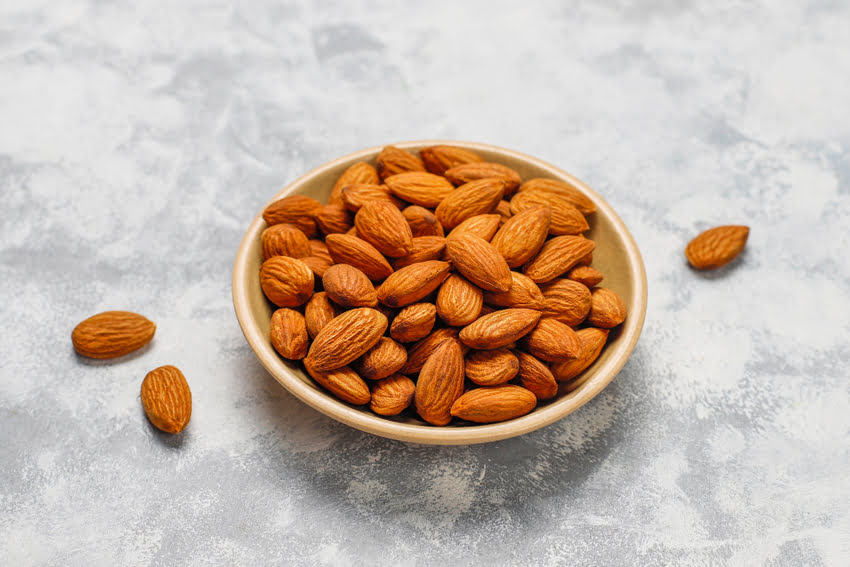Introduction to Almonds
First off, what are we talking about? Almonds are the seeds from the Prunus dulcis tree, native to the Middle East and South Asia, almonds have been cultivated for thousands of years and are now enjoyed worldwide. They belong to the Prunus family, which also includes peaches and cherries. Almonds are often categorized into two types: sweet and bitter, with sweet almonds being the variety commonly consumed. Rich in flavor and nutrients, almonds are a versatile ingredient that can be used in various dishes or enjoyed on their own.
Nutritional Profile of Almonds
Before diving into the benefits, let’s take a closer look at what makes almonds so nutritious. A 100-gram serving of raw almonds contains:
- Calories: 576
- Protein: 21.2 grams
- Fat: 49.9 grams (of which 3.7 grams are saturated)
- Carbohydrates: 21.6 grams
- Fiber: 12.5 grams
- Vitamins:
- Vitamin E: 25.6 mg (171% DV)
- Riboflavin: 1.1 mg (60% DV)
- Niacin: 3.4 mg (17% DV)
- Minerals:
- Magnesium: 268 mg (67% DV)
- Calcium: 264 mg (26% DV)
- Iron: 3.7 mg (21% DV)
As you can see, almonds are not only high in healthy fats but also rich in protein, fiber, vitamins, and minerals, making them an excellent addition to a balanced diet.
Almond Benefits for Skin
1. Promotes Healthy Skin
One of the most notable almond benefits is their ability to promote healthy skin. Almonds are rich in vitamin E, a powerful antioxidant that helps protect the skin from oxidative stress and damage caused by UV rays. Regular consumption of almonds can help maintain skin elasticity and prevent premature aging.
2. Hydrates and Nourishes
Almonds contain healthy fats that help keep the skin hydrated and nourished. The fatty acids in almonds can help maintain the skin’s natural barrier, preventing moisture loss and keeping your skin soft and supple. You can also use almond oil topically to moisturize your skin and improve its texture.
3. Reduces Inflammation
The anti-inflammatory properties of almonds can help reduce skin irritation and redness. Whether you suffer from conditions like eczema or simply want to soothe irritated skin, incorporating almonds into your diet or using almond oil can provide relief.
4. Fights Acne
Almonds can also help combat acne due to their high magnesium content. Magnesium helps regulate hormone levels, which can reduce the occurrence of acne breakouts. Additionally, the vitamin E in almonds can help heal existing acne scars and promote a clearer complexion.
Almond Benefits for Hair
1. Strengthens Hair
Almonds are packed with nutrients that can strengthen your hair. The protein content in almonds helps repair damaged hair and promotes healthy growth. Regular consumption of almonds can lead to stronger, shinier hair.
2. Nourishes the Scalp
The healthy fats in almonds can nourish the scalp, preventing dryness and flakiness. Almond oil can be massaged into the scalp to improve blood circulation and promote hair growth. It also helps to moisturize the hair, making it more manageable.
3. Reduces Hair Loss
Almonds contain biotin, a B vitamin that is essential for hair health. Biotin helps strengthen hair follicles and can reduce hair loss. Including almonds in your diet can provide your hair with the nutrients it needs to thrive.
4. Adds Shine
Using almond oil as a hair treatment can add shine and luster to your locks. It can help tame frizz and make your hair look healthier overall. Simply apply a small amount of almond oil to your hair, focusing on the ends, for a natural shine boost.
Almond Benefits for Heart Health
1. Supports Heart Health
One of the most significant almond benefits is their positive impact on heart health. Almonds are rich in monounsaturated fats, which are known to lower bad cholesterol (LDL) levels while increasing good cholesterol (HDL) levels. This balance is crucial for maintaining a healthy heart.
2. Reduces Inflammation
Chronic inflammation is a significant risk factor for heart disease. The antioxidants in almonds, particularly vitamin E, can help reduce inflammation in the body, promoting overall heart health. Regular consumption of almonds can contribute to a lower risk of cardiovascular diseases.
3. Regulates Blood Pressure
Almonds are a good source of magnesium, which plays a vital role in regulating blood pressure. Adequate magnesium intake can help relax blood vessels and improve circulation, reducing the risk of hypertension.
4. Aids in Weight Management
Maintaining a healthy weight is essential for heart health, and almonds can be a helpful ally in this regard. Their high protein and fiber content can help you feel full and satisfied, reducing the likelihood of overeating. Snacking on almonds can be a smart choice for those looking to manage their weight.
How to Incorporate Almonds into Your Diet
Now that you know the incredible almond benefits, you might be wondering how to add these nutritious nuts to your meals. Here are some delicious and easy ways to incorporate almonds into your diet:
1. Snack Time
Almonds make a perfect snack on their own. Keep a small bag of raw or roasted almonds handy for a quick and healthy snack that will keep you energized throughout the day.
2. Smoothies
Add a handful of almonds or a spoonful of almond butter to your smoothies for a creamy texture and a nutritional boost. They pair well with fruits like bananas, berries, and spinach.
3. Salads
Toss sliced or chopped almonds into your salads for added crunch and flavor. They complement leafy greens, fruits, and even grains beautifully.
4. Baking
Incorporate almond flour into your baking for a gluten-free alternative. Almonds can also be used in cookies, muffins, and cakes for added flavor and nutrition.
5. Almond Milk
Try making your own almond milk at home or purchase it from the store. Almond milk is a delicious dairy alternative that can be used in smoothies, cereals, or enjoyed on its own.
6. Almond Oil
Use almond oil for cooking or as a salad dressing. It adds a subtle nutty flavor and is a healthy fat option for your meals.
Risks and Considerations
While almonds are generally safe for most people, there are a few considerations to keep in mind:
- Allergies: Some individuals may be allergic to almonds. If you experience any adverse reactions after consuming almonds, consult your healthcare provider.
- Caloric Density: Almonds are calorie-dense, so it’s essential to consume them in moderation, especially if you’re watching your weight. A small handful (about 1 ounce or 28 grams) is a good serving size.
FAQs About Almonds
1. Are almonds good for weight loss?
Yes, almonds can be beneficial for weight loss due to their high protein and fiber content, which can help you feel full and satisfied.
2. Can I eat almonds every day?
Yes, incorporating a small handful of almonds into your daily diet can provide numerous health benefits. Just be mindful of portion sizes.
3. Are raw or roasted almonds healthier?
Both raw and roasted almonds have health benefits. However, roasting can reduce some of the nutrients, so raw almonds may be slightly healthier. Choose unsalted varieties to avoid excess sodium.
4. Can almond oil be used on the skin?
Yes, almond oil is an excellent moisturizer for the skin and can be used to improve skin texture and hydration.
5. How should I store almonds?
Store almonds in a cool, dry place, preferably in an airtight container. Refrigerating or freezing them can extend their shelf life.
6. Are almonds suitable for people with diabetes?
Yes, almonds can be a healthy snack option for people with diabetes, as they have a low glycemic index and can help regulate blood sugar levels.
7. How many almonds should I eat daily?
A serving size of about 1 ounce (28 grams), or roughly 23 almonds, is recommended for optimal health benefits.
Conclusion
Almonds are a delicious and nutritious addition to any diet, offering a wide range of almond benefits for your skin, hair, and heart health. From promoting healthy skin and hair to supporting cardiovascular health, the advantages of including almonds in your meals are numerous. With their versatility and flavor, it’s easy to incorporate almonds into your daily routine. So, the next time you’re looking for a healthy snack or ingredient, reach for almonds and start enjoying the many health benefits they have to offer!
Disclaimer:
This article provides general information, and the images are for reference only. It is not a substitute for professional medical advice, diagnosis, or treatment. Always consult a specialist or your doctor for more information. Well Health Organic does not guarantee the accuracy, completeness, or reliability of the information provided. We do not endorse any products mentioned in the article or through external links.



















